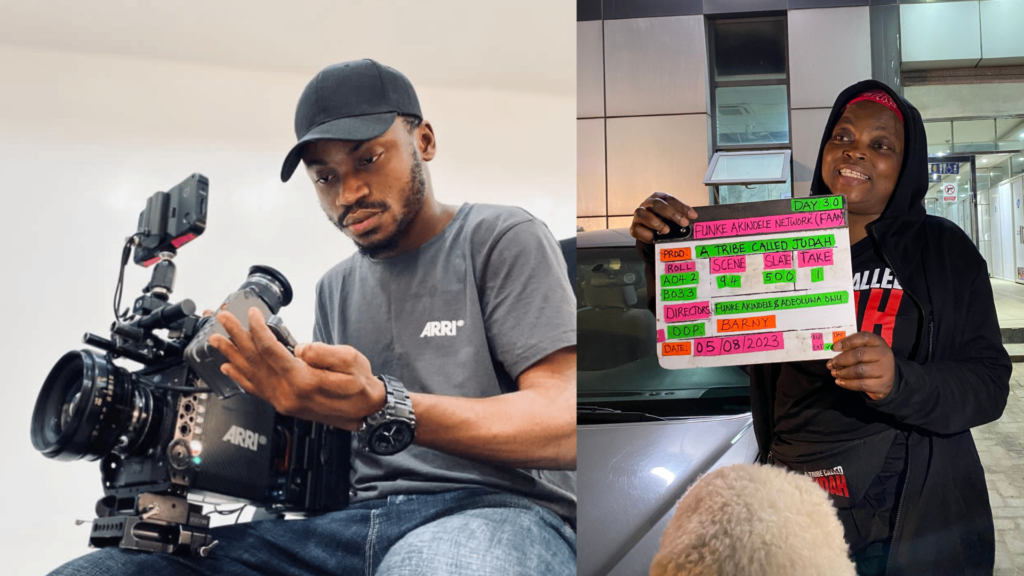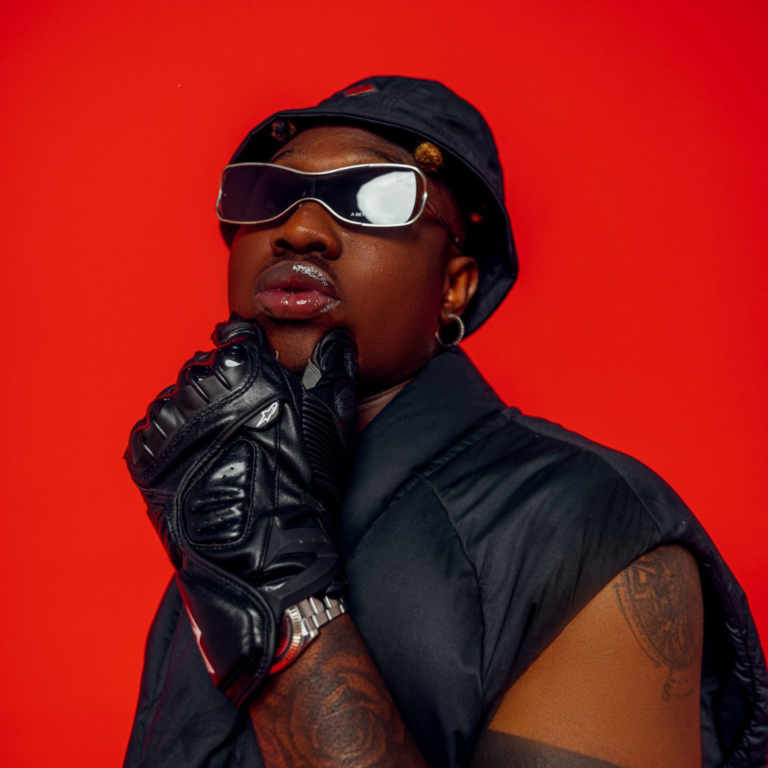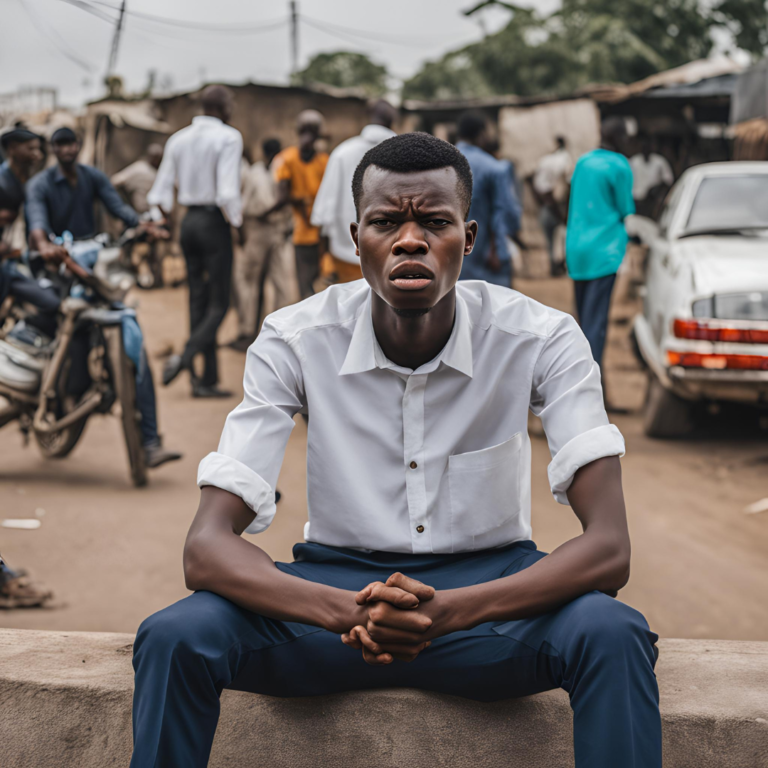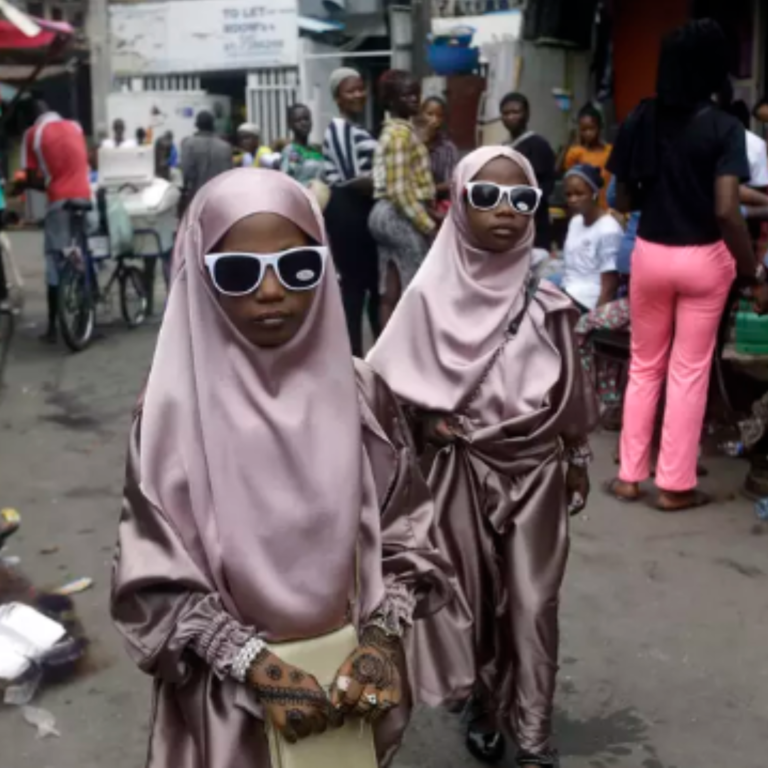
Funke Akindele’s latest production, A Tribe Called Judah (ATCJ), is Nollywood’s highest-grossing film of all time, but it’s also earned applause for its home-hitting storytelling and excellent cinematography. Its filmmaker and cinematographer, Barnabas Emordi, AKA Barny Blockbuster, is known for his camera work on other acclaimed productions like Ada Omo Daddy (2023), The Ghost and the Tout Too (2021) and Elevator Baby (2019).
In a chat with Zikoko, Barny shares his experience on the set of ATCJ, the importance of visual styles in film and his personal challenges in Nollywood.
How did you join the A Tribe Called Judah crew?
Barny: Aunty Funke (Funke Akindele) and film director, Adeoluwa Owu, brought me in during the script development in April 2023 before we went into preparation for shooting. When I read the script’s first draft, I saw the possibility of a big picture. This film has all the right attributes that drive the Nigerian audience to the cinema, like family and love. I and the entire team believed it would be a banger, but it exceeded expectations.
What intrigued you about the story?
Barny: Family. I think stories that pull families together are my speciality. In Elevator Baby, Day of Destiny and MTV Shuga Naija 5, the characters are uniquely complicated. A clear example is Pere Judah in A Tribe Called Judah. He’s one of his mum’s favourites, but he’s influenced by the environment he grew up in, his family and various complexities that have made him unique. He can still be called a good person who makes the ultimate sacrifice by stealing to save his mum’s life.
Many moving parts in the characters’ lives make them endearing to the audience, even if they aren’t perfect. That’s the beauty of humans — recognising our differences and coming together as a family or country to battle against whatever the world brings us. No matter how different the troublesome sons in A Tribe Called Judah are, there’s one consistent thing about them: they genuinely love each other, and they love their mother. They’re also united as a family, which is the core of the entire film.
What’s your favourite thing about the film?
Barny: I enjoyed being on set; it was beautiful to watch Funke Akindele at work. The details and intensity she puts into her work are motivating. I loved that and the dedication of the crew too. I had the tools I needed — I could bring out my visual style and execute properly.
How would you explain “visual style”?
Barny: Visual style is the element that builds the world in a film. Stories are different, and so are their visual styles. Visual style elevates the storytelling and the audience’s emotional attachment to the character. If all the elements and subtle techniques come together right, I’ve done my part as a cinematographer.
For A Tribe Called Judah, we aimed for realism. The visual style was to capture the essence of family, love and sacrifice. We employed lighting techniques that felt natural for various scenes. We used different cameras, like Arri Alexa 35 and Canon Sumire Primes, to make the audience emotionally attach to the Judah family.
What draws you to familial stories?
Barny: I genuinely love family. My family is fantastic; they love, support and care about every aspect of my life. They are my biggest supporters. I’ve also made incredible friends who are now family. They love wholeheartedly. I love films that preach family values, love, togetherness and sacrifice. Also, we practise communal living in Nigeria, and the family unit is the most important social institution in the world.
How do you balance creative independence with working with others?
Barny: The most important thing is understanding the overall vision for a project and knowing you’re a vital tool in bringing that vision to life. Filmmaking is a collaborative process. I know my work, but I fully understand that I’m a part of the team. This makes it easier to collaborate with other individuals.
As Barny Blockbuster, what would you say makes a blockbuster?
Barny: In the Nigerian context, a blockbuster is a film that makes over ₦100 million at the box office. It comes with joy that I’ve done this with Elevator Baby and Ada Omo Daddy, and now, A Tribe of Judah.
What was life like for you before Nollywood?
Barny: I was in school. I graduated from Delta State University with a degree in Mathematics in 2015. Before NYSC, I wanted to get busy with something meaningful. I reached out to my friend, Gbenga Gomez, a cinematographer and steady-cam operator who was already in the industry at that time, to let me follow him around and help with anything on set. During that period, I fell deeply in love with filmmaking.
Some people have deep meanings behind their love of filmmaking. For me, I’ve always loved watching movies, Nigerian or foreign. From the VHS to the DVD era, I watched all I could get my hands on. But the stronger pull was the money I thought I could make. My early days as an assistant on movie sets gave me a tangible amount of money that kept me going. I felt that if I worked hard and stayed committed to the art, it would lead me to success in the future. That motivation deepened my love for filmmaking.
What’s the first film you made?
Barny: It was with my friends. We used to do random jobs on film sets and put money together to make short films in our neighbourhood. It contributed significantly to our learning process, and we could trust each other to become better filmmakers and storytellers. But my first feature film as a camera operator is Elevator Baby.
Which of your films was hard to make?
Barny: Man, every film is hard to make in Nigeria. Ask other Nollywood filmmakers, and they’ll tell you the same thing. Something always comes up, like disturbances from touts, inadequate daylight to film and low budget. Budget is the biggest issue; a budget needs to be in place right from the film development stage. When the audience complains about weak plot in Nollywood movies, I think about this.
Imagine there’s no money to pay story developers. When they should be in the writing room for months, they can end up spending only a week in the writing room. That’s a problem. An inadequate budget will make a production that should take months to wrap up in weeks.
But the beauty of these problems is that we explore all our resources and creativity to deliver an excellent production. Nollywood still competes internationally; our stories are screened at international festivals and receive notable awards. Prominent brands are coming to Nigeria to collaborate with us because our genuine love for the art is evident to them.
Do these brands come with bigger budgets that have improved production quality?
Barny: The bigger brands are playing their role. Production quality has improved massively over the past few years, and money has been an important factor. Our scripts and productions are getting bigger. I’m genuinely excited about the next few years in Nollywood because there’s a certain level of excellence that’s notable. We’re already working on amazing stories that’ll excite the audience and strengthen the industry. It can only get better.
What’s a good budget for a movie?
Barny: It largely depends on the scale of the film you’re trying to make. Averagely ₦100-200 million for a mid-size film in Nigeria. It can go up to a million-dollar budget for a film like The Black Book. Budgets are determined by so many factors. It’s always tricky to call a number because you’ll need to factor in marketing and so many other aspects.
Are there emerging trends in cinematography you’re excited to explore?
Barny: I’ve been quite excited about the new sets of Arri lighting technology recently introduced to the market. It would help us to expand our lighting arsenal, expose us to various effects that’ll influence and stylise the way we approach lighting design in Nollywood. It’s pretty easy to operate as well, has the best colour rendering index (CRI), large range of lights, minimal power for maximum output and efficiency. It’s an outstanding development.
What challenges do you face in your work?
Barny: My biggest challenge is finding time to schedule all the projects I’ve set out to work on to avoid clashes. There’s always little time between finishing up a project, sitting down to study a new script, breaking it down in your head, and then, having a conversation with the producers or directors of the film to understand their vision. Filmmaking takes time, and one needs to prep and put things together so that execution can be great. That’s my primary challenge at the moment.
Seems like you’re suffering from success
Barny: I can’t complain. When things are like this, it also speaks to my efficiency and capacity to do great work, and that makes me bankable. Producers trust me to use their money well and deliver, and I have to live up to their expectation.
Does the volume of your output bother you?
Barny: I freelance, and that makes me open to working with all the biggest production companies in Nigeria. If one is consistent with executing big projects at high levels, it’ll attract more clients to you. That’s been my case, and so far, I like it.
What’s the difference between working freelance or non-freelance as a cinematographer?
Barny: If I wasn’t working freelance, I’d be stuck working with one production company for the duration I signed in a contract. Production companies may not produce more than one or two films in a year due to development and preparation time. Freelancing lets me take on as many jobs as possible. It gives me the freedom to execute projects that align with what I’m trying to achieve in the industry.




